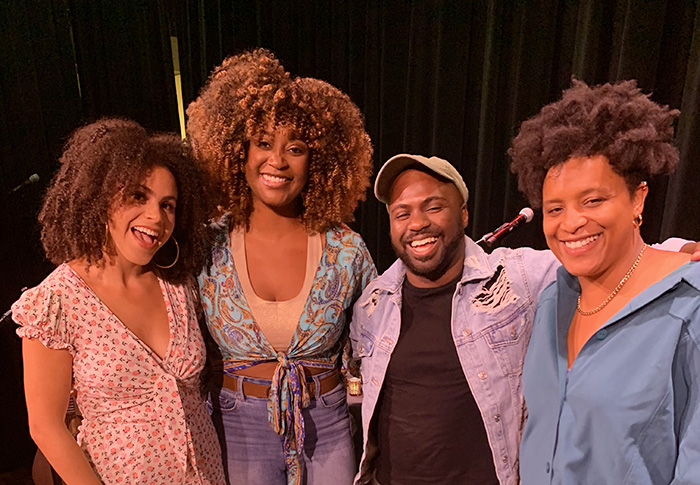By Mark Frost, Chronicle Editor
I first heard of something called “Black Opry Revue” when I saw a two-inch ad in our newspaper that said it was coming to the Park Theater on Thursday, Sept. 29.
It made me curious enough to do a web search that led me to blackopry.com.
“Black Opry,” it explained, “is home for Black artists, fans and industry professionals working in country, Americana, blues, and folk music. Country and roots music have been made and loved by Black people since their conception. For just as long, we have been overlooked and disregarded in the genre. Black Opry is changing that.”
It turns out to be the brain-child of a woman named Holly G.
I like country music. I like black music. The combination of the two? Intriguing, especially because I knew they overlap.
I paid my $30 and went to the Park.
It turned out to be an audience of three — me and two women, each of us sitting at a separate cocktail table. Plus, two Park Theater staffers and two women manning the Mean Max beer booth.
The photo on the Black Opry web page showed maybe 15 performers. I couldn’t imagine so many would come to Glens Falls, but then again I had no idea at all.
Four performers took the stage, sat on raised chairs, guitars in hand. They took turns, left to right, doing personal songs.

It turned into a terrific, penetrating evening, so glad I was there.
After the show, I talked with them.
They said the Black Opry concept has been huge for them — validating their music and life experience, giving them a career-propelling performance platform.
Julie Williams is from Florida, Roberta Lea from Virginia, Tae Lewis from North Carolina, Denitia Odigie — who uses just her first name — is from Texas.
“Holly found us all and brought us all together,” they said during the show.
Julie and Tae have made the move to Nashville. Three of the four left promotional cards on the tables so we can find them and their music on the web.
“I grew up in East Texas,” Denitia told me. “I grew up on country music…and going to rodeo. My dad was wearing boots and a cowboy hat and a big buckle and that was just normal, you know what I mean? Everybody was doing that.
“Then when I was a teenager I got more into like, alternative rock ‘n roll. My life is really like a journey through music. I’ve experimented with different things. And I feel like this record is kind of my first foray into something that feels distinctly Americana. It kind of plays with the country genre a little bit, so it feels kind of like a return to home in a way.”
Roberta said her music scores with her hip hop contemporaries. “They eat it up because it’s not just about the people who look like us singing country music, but it’s also about our stories being in country music…..
“You know, Dolly has her blonde song. And that’s her experience, and that’s her truth. But we have an experience too, and we don’t hear that in country music a lot. And so bringing it to an area like Virginia, where it’s very popular, hip hop, and I’m like, ‘Hey, I do country music. And here’s my song Ghetto Country Streets,’ and people are like, I get it, I get it. So for me it’s been a lot of support.”
I asked who inspired them growing up. Tina Turner, said Roberta.
“She doesn’t get a lot of credit in country music that she deserves. I mean, she was from Tennessee, she’s country. So when I started to hear more about her story, and how the process was difficult for her to dive into something she really loved, it was really inspiring.”
Julie and Tae cited white performers.
Julie, raised in Florida, said, “I grew up listening to the 90s country — women like The Chicks, or the Dixie Chicks, Shania Twain — women that taught, you know, ‘Ready to Run,’ ‘Born to Fly’ — all these songs of independence and freedom, and being who you are, even like, you know, how to dispose of a dead body if you need to” alluding with a wink to the Dixie Chicks’ hit “Goodbye Earl.”
“So I used to love country. And then I kind of went away from it, because it became synonymous to the music that was like blasting out of trucks with Confederate flags. And I didn’t really think that there was a space for me in country, even though like, if you saw me when we saw Sara Evans, I knew every word and I was screaming with my mom.
“And it took me moving to Nashville and starting to write and those songs coming out as country songs. It has other influences, of course,” but she said with Black Opry, “my song writing has grown, my artistry has grown, because I’ve felt comfortable to be 100%.”
Tae Lewis’s biggest influence? “Hunter Hayes,” who’s from Louisiana. “So he listened to a lot of blues, R&B. That’s what he grew up on. So me and him kind of intertwine…He’s one person that has inspired me in what I do as an artist.”
Tae — who said during the show that he spent time living in Clifton Park — said his new single is “Party All Night.” He’s also got “A Lot to Drink About,” complete with a Red Solo Cup reference.
Roberta offered, “If I’m Too Much of a Woman” you’re too little of a man.
Denitia’s songs included “All The Sweet Tea” and “Old Friend.”
Every one of these performers had something to say in song.
Julie Williams struck me as somebody who could break big. Her first tune was “Mixed Feelings.” I learned later that her being of mixed race is subject matter she explores. I also learned that she graduated from Duke University.
The performers weren’t fazed by the small crowd. “We hope it’s the first time of many times back here,” Tae declared to our crowd of three.
Black country/Americana performers don’t start with a ready-made constituency. Black Opry enables Julie, Roberta, Tae and Denitia to be building their own.
Copyright © 2022 Lone Oak Publishing Co., Inc. All Rights Reserved
 Glens Falls Chronicle Serving the Glens Falls/Lake George region; Warren, Washington and northern Saratoga counties since 1980
Glens Falls Chronicle Serving the Glens Falls/Lake George region; Warren, Washington and northern Saratoga counties since 1980


